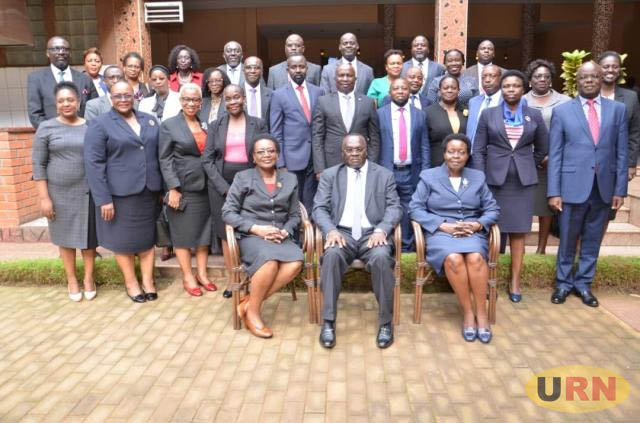
Kampala, Uganda | THE INDEPENDENT | Chief Justice Alfonse Owiny-Dollo has urged judicial officers to prioritize quality judgement writing and to take training sessions seriously even if the topics seem familiar to them.
Owiny Dollo was opening a two-day workshop on judgment writing for High Court Judges in Kampala.
The training organized by the Judicial Training Institute is being facilitated by the Supreme Court and Court of Appeal of Justices including Justice Catherine Bamugemereire, Irene Mulyagonja, Justice Fredrick Egonda-Ntende and Justice Christopher Izama Madrama and Senior Lawyers and members of the Academia like John Mary Mugisha and Professor Ben Twinomugisha.
Owiny-Dollo stressed that judgment writing is a critical aspect of a judge’s role, requiring a deep understanding of the law and the ability to articulate well-reasoned opinions. He noted that a judgment is not a mathematical or scientific exercise but rather a thoughtful analysis of the evidence presented.
The Chief Justice also emphasized the importance of quality over quantity in judgment writing. He encouraged judges to strive for clarity and precision in their decisions, rather than simply churning out lengthy opinions.
He also reminded the judges that their decisions have a significant impact on the lives of Ugandans and therefore they should be written with the wider public in mind.
He praised retired former Chief Justices Waako Wambuzi, Benjamin Odoki, and Supreme Court Justice Arthur Oder who he said were known for their exceptional judgment writing skills.
The Chief Justice also informed the Judges on the importance of work-life balance, and advised them not to hear cases throughout the week. He recommended setting aside time for writing judgments, resting, and engaging in other activities that promote well-being.
He also emphasized the need for judges to be firm, fair, and respectful in their dealings with litigants and lawyers. He encouraged them to be open to feedback and to continuously improve their skills through training and mentorship.
Further , the Chief Justice expressed his commitment to supporting judicial officers in their work, as long as they remain on the right side of the law. He acknowledged the progress made in reducing case backlogs and improving supervision of lower courts, and expressed hope that the training would further enhance the performance of Magistrates Courts.
Damalie Lwanga, the Executive Director of the Judicial Training Institute said the training aims to improve efficiency and consistency in judgment writing, ultimately enhancing public confidence in the Judiciary.
Lwanga emphasized that judgment writing impacts the quality of justice delivered by the Judiciary and that it’s the best way to maintain the rule of law, set precedence, and establish jurisprudence.
She also highlighted the importance of regular refresher training, stating that learning never ends.
According to Lwanga, plans are underway to conduct similar trainings annually, inviting more judges to improve their skills.
In addition to judgment writing, she said the workshop also focuses on enhancing judges’ technological skills, particularly in using Information and Communication Technology (ICT).
“Apart from judgment writing, we are also talking about enhancements in technology, such that they know how to use ICT,” Lwanga explained.
In June 2023, Deputy Chief Justice Richard Buteera said the Judiciary is in the process of developing a judgement writing tool to improve the rate of case disposal and quality of judgements.
Judiciary indicated that the tool shall provide research materials and methods, as well as judgment formats in an agreed style for uniformity of their judgments and also ease on the workload of the Judicial officers.
***
URN
 The Independent Uganda: You get the Truth we Pay the Price
The Independent Uganda: You get the Truth we Pay the Price



